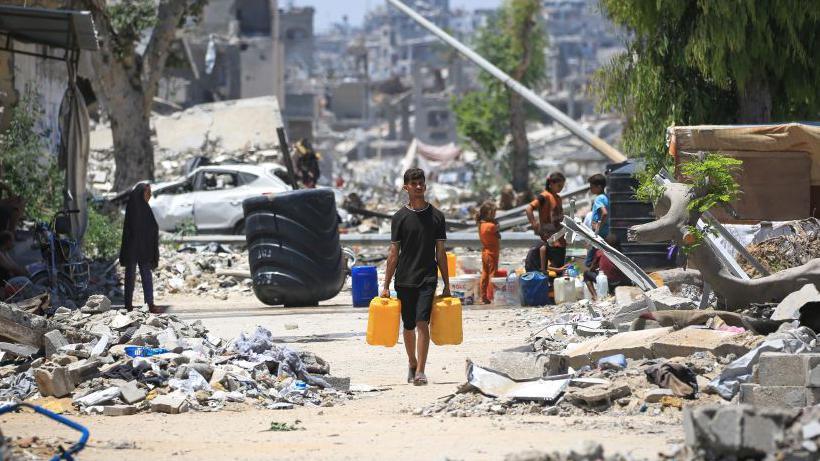Hamas seeks 'complete halt' to war in Gaza proposal response

- Published
Hamas says it has submitted its response to a US-backed plan for a ceasefire in Gaza, with a senior group official telling the BBC that it still requires an Israeli commitment to a permanent ceasefire.
In a statement, the group, and its Palestinian Islamic Jihad (PIJ) allies, expressed "readiness to positively" reach a deal.
The proposed ceasefire plan - which was endorsed by the UN security council on Monday night - calls for a six-week ceasefire that would eventually become permanent.
Qatar and Egypt - who, along with the US, have mediated negotiations between Israel and Hamas - confirmed that the Palestinian group had submitted its reply.
In its statement on Tuesday evening, Hamas called for a "complete halt" to fighting in Gaza.
"The response prioritises the interests of our Palestinian people and emphasises the necessity of a complete halt to the ongoing aggression on Gaza," Hamas and the PIJ said.
The groups added that they were ready "to engage positively to reach an agreement that ends this war".
White House national security spokesperson John Kirby said it was "helpful" that Hamas had submitted a response and that US officials were "evaluating" the group's requests.
Earlier on Tuesday US Secretary of State Antony Blinken said Israeli Prime Minister Benjamin Netanyahu had "reaffirmed his commitment" to the Gaza ceasefire plan and the world was waiting for the Hamas response.
The proposal set out by President Biden last month involves an initial six-week ceasefire, with Hamas releasing some hostages in exchange for Israel releasing an undefined number of Palestinian prisoners.
A second phase would see the remaining hostages released by Hamas and a total withdrawal of Israeli forces from Gaza as part of a “permanent” ceasefire, but the latter would still be subject to negotiations.
The actual Israeli proposal - reportedly lengthier than the summary presented by Mr Biden - has not been made public and it is unclear whether it varies from what the president conveyed in his statement on 31 May. It was presented to Hamas days prior to Mr Biden's speech.
Mr Netanyahu has acknowledged his war cabinet has authorised the plan but has not voiced unequivocal support for it. Far right members of his cabinet have threatened to quit his coalition and trigger its collapse if the deal goes forward, seeing it as surrender to Hamas.
Netanyahu walks tightrope as US urges Gaza ceasefire deal
- Published10 June 2024
UN Security Council backs US Gaza ceasefire resolution
- Published11 June 2024
As Mr Blinken met Israeli officials in Tel Aviv on Tuesday, protesters outside his hotel held American flags calling for an agreement. Many held pictures of hostages and chanted: "SOS, USA", and "we trust you, Blinken, seal a deal".
Vicki Cohen, the mother of Nimrod Cohen, 19, an Israeli soldier who was kidnapped by Hamas on 7 October, held a banner showing his picture.
She told the BBC: "We come here to ask Blinken and the USA government to help us, to save us from our government. Our prime minister doesn't want to bring our loved ones back, we need their help to pressure our government."
He then travelled to the Dead Sea for a conference of Arab leaders calling for greater aid access into Gaza, where he said Israel "can do more". He also announced $404 million in new aid for Palestinians, urging other countries to also "step up" assistance.
The war began after Hamas attacked Israel on 7 October, killing about 1,200 people and taking 251 others back to Gaza as hostages. The Hamas-run health ministry in Gaza says more than 37,000 people have been killed in the Israeli offensive since then.